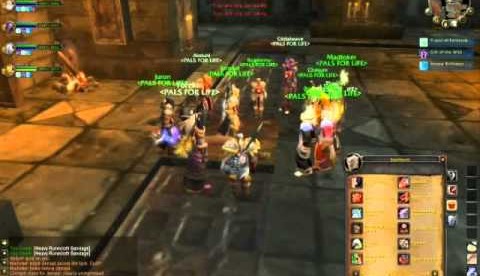Political Prisoners in China are Sometimes Made to Play WoW. Here’s Why.


“Gold farming” sounds like a great idea — plant seeds, but instead of reaping crops of soy or corn, out comes gold. The stuff of fantasy? Definitely — and, in the case of actual gold farming, literally. Gold farming is something straight out of World of Warcraft.
Massively multiplayer online role playing games (“MMORPGs”) such as World of Warcraft each have their own internal economy. Typically, the currency from the economy — let’s call it “gold” — is earned by the player by slaying monsters or completing tasks. With planning and practice, in many cases a player can kill the same enemy or group of enemies over and over, earning a gold reward each time. Do this for hours on end and you can end up with a lot of gold — enough to sell, outside of the game, for real money. The market for currency in World of Warcraft is robust (just check out the ads here). By some estimates, one can earn $3-6 per hour from gold farming.
Many of the high volume gold farmers are low-paid (obviously) laborers in sweatshops. But in China, some have one-upped that — political prisoners have been forced to play games for 12 hours on end, earning gold for the prison bosses.
According to the Guardian, prisoners at the Jixi labor camp in China would spend their days doing the manual labor that one would typically expect from the term “labor camp.” But at night, they’d be logged into online MMORPGs, told to slay fantasy monsters, collect the rewards dropped, rinse, and repeat. Per one inmate, the prisoners, collectively, in his group, collected as much as $1,000 a day for their captors — a take reaped by inmates under threat of force.
All together, whether they are prisoners or sweatshop laborers (or otherwise), the Guardian estimates that 100,000 Chinese are “employed” as gold farmers.
Bonus fact: While prisons in China may keep World of Warcraft’s black market thriving, U.S. prisons keep a different industry afloat — the typewriter industry. Swintec, a company that makes typewriters, has contracts with 43 states to provide the machines to prisons, with one interesting riff: the typewriters need to be transparent. This way, inmates cannot hide contraband in the machines.
From the Archives: The $13,000 Nintendo Game: Real money, not ones and zeroes.
Related reading: “The Great Wall of Confinement: The Chinese Prison Camp through Contemporary Fiction and Reportage,” by Philip F. Williams. Four and a half stars total from seven reviews

Leave a comment